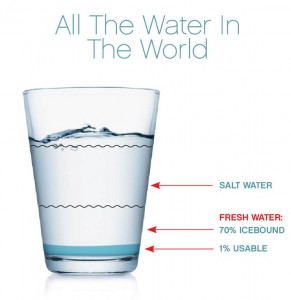Last week, Priva Chellani posted an excellent essay (see below) on the Jones Lang LaSalle Green Blog about water usage in the Middle East. Her points ring true for all of us throughout the world. Without conscious conservation it doesn’t matter what lengths we go to obtain clean drinkable water it is still a scarce resource that will only be truly conserved with a societal recognition of the problem coupled with individual action and government regulation that measures and enforces that action.
Water = Life, Oil = Energy, Water + Oil = Desalination
Posted: 20 Dec 2012 10:18 AM PST
Posted by:
Priya Chellani
Property and Asset Management, UAE
The Water Security Risk Index 2011, an annual report produced by Maplecroft that measures the future stability of water supplies across 162 countries, rated six Middle Eastern countries: Kuwait, Egypt, Iraq, United Arab Emirates, Saudi Arabia and Libya at ‘extreme risk’, while Iran and Qatar were rated ‘high risk’. 52% of global water desalination occurs in the Middle East; one of the most energy intensive and therefore expensive methods of obtaining water for consumption.
Yet, the region continues to hit new highs of per capita water consumption. Water which is so dearly obtained, must surely be used judiciously? The regulatory, societal and individual spheres have to combine to promote responsible use.
Regulation can help:
What is not measured and monitored is often wasted. With even recently built high-rise buildings having only main water meters, there is little incentive to drive down consumption by individual tenants. Building regulation that enforces the installation of water sub-meters corresponding to the number of occupants would encourage greater consumption transparency.
Societal influence:
A society that collectively encourages water conservation practices influences individual behaviour. Highlighting water issues through initiatives such as the adoption of Sustainable Water Supply and Clean Technology as one of the Expo2020 Dubai themes encourages collective reflection.
Individual initiatives:
The aspirations of a contemporary generation are reflected in the increasing popularity of outdoor leisure sports such as golf which involves growing and maintaining vast expanses of open turf. To reflect upon a comparison:
- Amount of water it would take, per day, to support 4.7 billion people at the UN daily minimum: 2.5 billion gallons
- Amount of water used, per day, to irrigate the world’s golf courses: 2.5 billion gallons!
The International Golf Federation, recently agreed to a policy to make sustainability a core priority through initiatives aimed at conserving water and reducing impact on land; which embrace measurement, target setting, transparency and verification. Players and followers of the sport can surely support water sustainability by selectively patronising those clubs that adopt extensive water conservation measures.
Neither water, that is essential to human life, nor oil that is an essential fuel to the global economy, are infinite resources. In a region so heavily dependent on desalination as the main water source, conserving one is equal to conserving the other.

